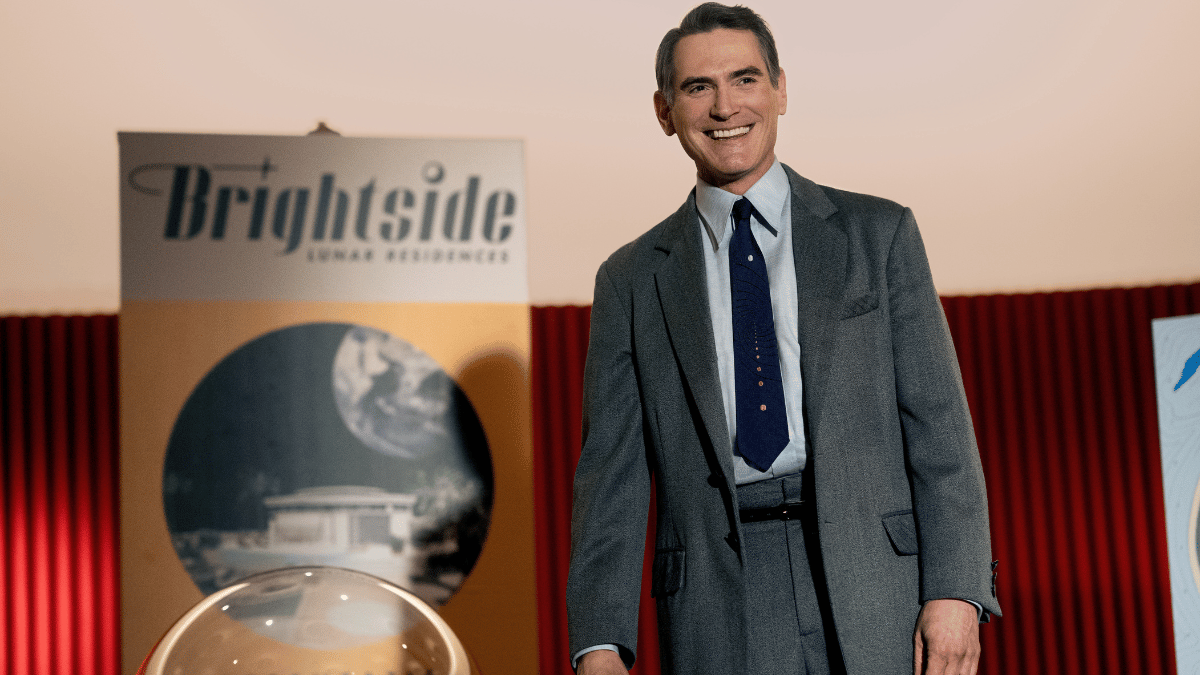
Image via Apple TV Plus
Hello Tomorrow, which premieres on Apple TV on Feb 17, exists in a world futuristic ’50s kitsch, where huge Buicks glide by without wheels, and salesmen sell people lunar timeshares. Perfect picket fences, retro-tech Facetime, and an endless stream of ‘can do’ optimism shapes an American society where no dreams are too big.
In this world of chrome-plated aspirations no one thinks bigger than Jack Billings, chief salesman for Brightside Lunar Residences. A man with infinite amounts of patter, perfectly-tailored attire, and an infectiously sunny disposition guaranteed to raise a smile. Billings is portrayed by Billy Crudup, who not only gives audiences a character who can convince as he peddles interstellar pipedreams, but also an Emmy award-winning actor who can bring some depth to this left-field premise.
However, what exactly creators Amit Bhalla and Lucas Jansen were aiming at with Hello Tomorrow is unclear. Whether their intention was to create an endearing father-son narrative, allegorical social commentary piece, or simply a lightweight of drama for easy consumption – this show never gets comfortable.
As fellow salesmen in the lunar housing market, both Herbie Porter (Dewshane Williams) and Eddie (Hank Azaria) feel thinly drawn. Although Eddie has a stereotypical gambling problem, which offers him some sort of dramatic definition, Herbie is only shaped in opposition to his wife Betty (Susan Heyward) and their bickering. As an ensemble of likeable characters, the people who inhabit this universe are nice enough, but plainly put Hello Tomorrow lacks backbone.
After 4 episodes of thirty minutes, little in the way of narrative action has occurred, save a new addition to Brightside’s sales force in Joey Shorter (Nicholas Podany). Unfortunately, the reasons why Jack has hired this young man are easy to spot, even before things are revealed 2 hours in. Before this groundbreaking epiphany occurs, audiences will be left floundering once the superior visual affects lose their luster.
Even with the early inclusion of Alison Pill (Myrtle Mayburn) — who proved such an asset in Star Trek: Picard — Hello Tomorrow barely gets going. As a disgruntled housewife who leaves her husband and tries heading to space, this actor is wasted save some nice moments opposite Dewshane Williams and Hank Azaria.
Either playing broad farce or exasperation, Myrtle Mayburn remains the very lightest of comic relief in a show that appears to lackluster. Even when she teams up with Lester Costapoulos (Matthew Maher), a government official who seems hell-bent on closing Brightside down, events never really expand as some might expect.
The chief problem with Hello Tomorrow is how long things take to get going, as nagging home bodies who berate their husbands for being on the road lack drama. As polished, poised, and complete as Billy Crudup might be portraying Jack Billings, a show needs more than one complex performance to make magic happen. Reasons for why Joey Shorter comes on board as a salesman feel convoluted, this necessity to travel from town to town peddling property lacks purpose, and after 2 hours any sub-plots have next to no substance.
That being said, if the intention of Amit Bhalla and Lucas Jensen was to celebrate dreamers who think big, then perhaps this Apple Original has something to offer after all. From minute one all audiences want to see is the money shot, comprising of people living in space. That these filmmakers deny them the pay off, avoid rocket ships, and instead focus on character is maybe a failing.
As much as there is a sense of wonder in the domestic use of technology, audiences will always opt for rocket ships over robot dog walkers. Self-fastening ties, morning paper projectiles, and jetpacks to work over jalopies just lack sex appeal. Audiences are now much more discerning about what they watch, if for no other reason than streaming services cost money. Meaning that program makers must try harder. There needs to be a solid and engaging story with real human interest driving things forward, otherwise audiences will go elsewhere.
Unfortunately, Hello Tomorrow is not the compelling premise Apple was sold when it greenlit this project. There is a whole bundle of talent with not much to do and no direction. As with everything Apple – the show may lack substance, but its production values are impressive. This really does feel like a slice of ’50s Americana, with flashes of the original Lost in Space tech-wise – which if nothing else works in its favor.
Fans of Bioshock or Fallout might be expecting a homecoming, but without a half-decent story to back up those impressive visuals, then audiences will surely feel let down.
Middling
Polished, poised, but ponderous in spite of top-tier production design – wave goodbye to Hello Tomorrow




